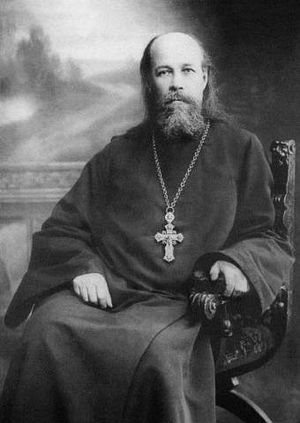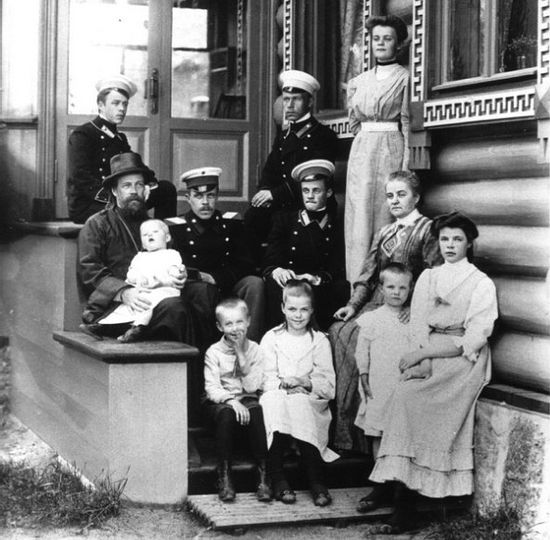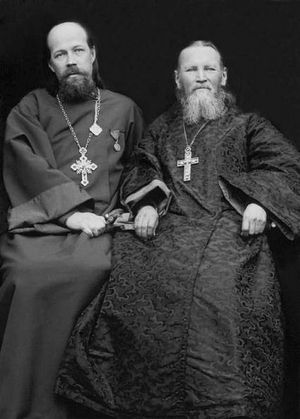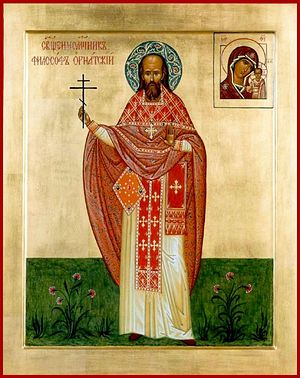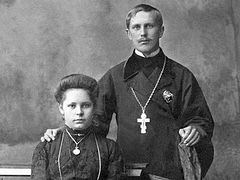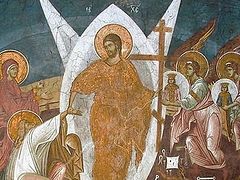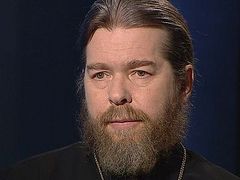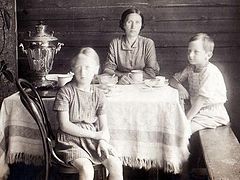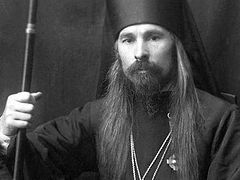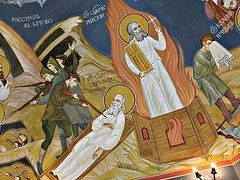Hieromartyr Archpriest Philosoph Nikolaevitch Ornatsky was born the son of a village priest on May 21, 1860, in the New Yorga church district, Cherepovets County, Novgorod Province. One of his brothers was married to a relative of St. John of Kronstadt. Philosoph was educated first at the Kirillov Religious School, and then at the Novgorod Seminary. In 1885, he graduated from the St. Petersburg Theological Academy, receiving a Candidate in Theology degree. In the Summer of 1885, he married Elena Zaozerskaya, daughter of the former subdeacon to Metropolitan Isidore, and soon was ordained a priest. Initially, batiushka served as rector of the church at the Prince Oldenburg orphanage, where he had previously taught classes in the Law of God.
From 1892 to 1912, he served as rector of the church attached to the Expedition for Production of Government Paper [Currency], a division of the Finance Ministry. For twenty years, he headed the “Association for dissemination of religious and moral education in the spirit of the Orthodox Church,” a society that was effective in opposing anti-religious movements.
In 1893 Fr. Philosoph was chosen as a clergy representative for the St. Petersburg Duma, an office he held until 1917. He took part in establishing shelters, orphanages, and workhouses in the city, and through his efforts 12 churches were erected in greater St. Petersburg, the largest of which was the Church of the Nativity of Christ next to the Warsaw Railroad Station. One could also mention the Church of Sts. Peter and Paul at Lesna, the Church of Venerable Sergius of Radonezh on Novosivkovskaya Street, Venerable Seraphim of Sarov on the Narva Outpost, the Church of St. John the Forerunner in the Vyborg area, the St. Gerasimos Church, and the Church of Hieromartyr Isidore of Yuriev.
Batiushka had a large family (including 10 children), and lived quite simply. All of the many social activities and responsibilities he bore to the glory of God did not bring in the means on which to subsist. Enormous amounts of money passed through his hands as director of church building committees, yet he had to give private lessons in order to support his family.
Batiushka was also known for being editor and censor for religious magazines published in the capital – e.g. “The St Petersburg Religious Herald” (first published in 1894), “Christian Relaxation”“ (begun in 1901), “The Orthodox Russian Word”“ (begun in 1902).
Fr. Philosoph was one of the closest colleagues of Hieromartyr Metropolitan Benjamin (Kazansky) of Petrograd and Gdov. While Metropolitan Benjamin was a student at the St. Petersburg Theological Academy, batiushka actively encouraged him to preach among the workers of St. Petersburg. Fr. Philosoph also maintained ties of spiritual friendship with Most-holy Patriarch Tikhon.
For almost twenty years, Fr. Philosoph was a spiritual child of Holy Righteous John of Kronstadt, who often visited his home, and who would give his blessing to all endeavors he undertook for the benefit of the Church. That holy pastor entrusted Fr. Philosoph with the duty of being an intermediary in his correspondence with Holy Hierarch Theophan, wonderworker of Vyshno.
In 1913, batiushka was appointed rector of St. Petersburg's Kazan Cathedral. During World War I, Fr. Philosoph gave up his apartment for use as a field clinic for wounded soldiers; he and his family moved into a small office space. More than once, he would accompany military transports into areas of military conflict, bringing necessities and produce to the troops, and striving with all his might to inspire and support the defenders of the Homeland.
His son Nikolai (born in 1886) was a military physician with the 9 th Russian Army. His son Boris (born in 1887) was a captain of the 23rd artillery brigade. He was a graduate of the Konstantinov artillery school, and fought heroically on the Austro-Hungarian front. Batiushka's gift for homiletics attracted those seeking after the living word, and more than once, he called upon his flock to reject the corrupting ideals of Bolshevism. Comprehending that Orthodoxy was the foundation of Russian national life, he would tirelessly and repeatedly call upon the intelligentsia to see that “Our intelligentsia must become Russian.”
During the revolution, he was eyewitness to the execution of his sister-in-law's husband, Hieromartyr Archpriest Peter Skipetrov (commemorated January 20). At his funeral, batiushka gave a homily fearlessly denouncing the Bolsheviks. On several occasions, he would speak out before the flock with an appeal for Russians to unite around churches in defense of the nation's holy things. In January 1918, after Fr. Peter Skipetrov was killed at the St. Alexander Nevsky Lavra, batiushka organized the defense of the Lavra by having Processions of the Cross come to the Lavra from all of the churches in the capital.
On August 1, 1918, he and two of his sons, Nikolai and Boris, were arrested. At the time of his arrest, he was completely calm and unperturbed. His parishioners formed a great mass of people going along the Nevsky Prospekt to the CheKa [Special Services headquarters] on Gorokhovo, and demanding their pastor's release. The CheKa agents admitted a delegation of the faithful, deceitfully promising to grant their request. However, that same night (presumably the eve of August 2, 1918), they transferred batiushka to the prison in Kronstadt. Around October 30, 1918, Fr. Philosoph, along with his sons and another 30 imprisoned officers, were taken to be shot. Along the way, batiushka read aloud to the condemned the prayers for the departure of the soul. According to one conjecture, their place of execution was in Kronstadt; according to another, it was near the Bay of Finland, between Livogo and Oranienbaum. Presumably, their bodies were cast into the bay.
In 1981, ROCOR proclaimed them as members of the host of New Martyrs and Confessors of the Russian Church. At the Jubilee Council of Bishops of the Russian Orthodox Church in August 2000, they were likewise glorified for general veneration throughout the entire Church.

